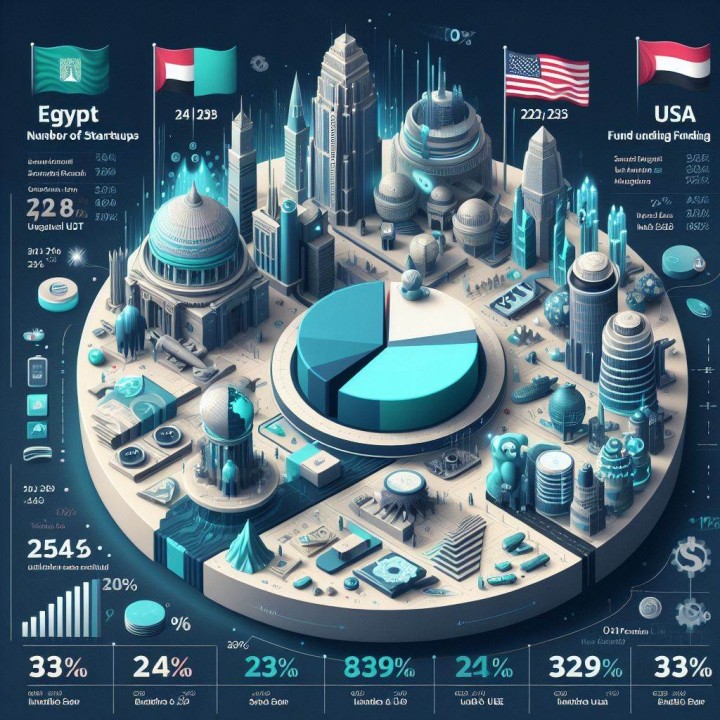Introduction:
The startup ecosystems in the USA, Egypt, Saudi Arabia, and the UAE present unique opportunities and challenges for entrepreneurs and investors. This detailed comparison explores the number of startups, funding statistics, success rates, and sector distributions within these regions, reflecting their distinctive economic landscapes up to 2023.
Detailed Comparative Metrics:
- Total Number of Startups and Funding Overview:
- USA: With over 72,500 startups in 2023, the USA remains a global leader in startup activity. However, the country experienced a downturn in venture funding, with total investments reaching $138 billion, down 37% year-over-year (Crunchbase News).
- Egypt, Saudi Arabia, UAE: In 2022, startups in these countries raised a combined total of nearly $3.5 billion. The UAE led with $1.85 billion, Saudi Arabia followed with $907 million, and Egypt secured $736 million (Economy Middle East).
- Sector Focus and Funding Allocation:
- USA: The AI sector saw a significant increase in funding, capturing more than a quarter of all investments in 2023. This was part of a broader trend where technology-driven sectors continued to attract substantial funding despite overall declines (Crunchbase News).
- MENA Region: Fintech remains a dominant sector, especially in Saudi Arabia and the UAE, reflecting a strong push towards digital transformation and economic diversification (MAGNiTT) (Economy Middle East).
- Startup Success and Funding Dynamics:
- USA: Approximately 52% of small business owners sought venture capital as their next funding source in 2023, despite the challenging economic climate (MarketSplash).
- MENA Region: The startup ecosystems in the MENA region are showing robust growth with increased deal volumes and higher funding amounts, indicating a maturing ecosystem that is beginning to attract more significant investments and achieve higher success rates (Economy Middle East).
- Unicorn Companies and Market Impact:
- USA: Continues to lead with the highest number of unicorn companies globally, reflecting its mature ecosystem and diverse industry presence. As of 2023, the United States leads globally with a substantial number of unicorn companies, totaling 653. These are startups valued at over $1 billion each, showcasing a diverse and mature ecosystem across various sectors like SaaS, fintech, and health tech.
- MENA Region: The emergence of unicorns in the region is growing, with companies like Kitopi and Swvl reaching unicorn status, signaling the rising potential of MENA startups on the global stage (english.alarabiya). The Middle East and North Africa (MENA) region, while growing rapidly in its startup scene, has a significantly smaller number of unicorns. Currently, the MENA region has about 6 unicorn companies (worldpopulationreview) (Hurun UK).
- Comparative Analysis of Key Industries:
- USA: Diverse with significant investments in AI, fintech, healthcare, and clean tech.
- Egypt: Focuses on fintech and e-commerce due to rapid digitalization and growing internet penetration.
- Saudi Arabia and UAE: Heavily invested in fintech and blockchain technologies, aligning with strategic national objectives to foster innovation and digital economies.
Jobs creation:
The impact of startups on job creation in Egypt, the UAE, Saudi Arabia, and the USA can be significant but varies widely based on the size of the economy, the sector focus of startups, and the maturity of the startup ecosystem:
- United States: The exact number of jobs created by startups in the USA each year varies, but it is widely acknowledged that startups are a major driver of new job creation. According to the U.S. Small Business Administration, small businesses, which include new startups, have added 1.4 million jobs annually over the last decade.
- Egypt: In Egypt, the startup ecosystem, particularly in the ICT sector, has been growing. The sector’s contribution to GDP increased significantly, indicating that it also contributes substantially to job creation. While specific figures on jobs created by startups alone are not detailed, the broader tech sector has been instrumental in job creation, especially with government initiatives to expand digital infrastructure and smart city projects (Oxford Business Group).
- United Arab Emirates (UAE): The UAE has a strong focus on technology and innovation, with significant government investment in AI and other tech sectors. Specific job creation numbers for startups aren’t readily available, but the push towards transforming Dubai into a smart city and the strategic initiatives around AI indicate a substantial impact on employment in these sectors.
- Saudi Arabia: Saudi Arabia’s Vision 2030 and the National Transformation Program emphasize digital transformation and economic diversification, which include growing the startup ecosystem. Although exact figures on jobs created directly by startups are not specified, the broader impact of these initiatives includes substantial job creation across new economic zones and sectors like fintech and e-commerce. Vision 2030 aims to boost the contribution of small and medium-sized enterprises (SMEs) significantly, which would inherently include job creation by startups (thestartupscene).
Summary:
The analysis underscores the vibrant dynamics of the startup ecosystems in the USA, Egypt, Saudi Arabia, and UAE. While the USA remains a mega house in innovation and startup success, the MENA region is fast emerging as a significant player with growing investments and an increasing number of successful startups. Entrepreneurs and investors should consider these insights to strategically navigate and leverage opportunities in these diverse markets.



